For those of us that find ourselves doing a bit of creative writing, whether for a story, tabletop campaign,, or the next bestselling fiction series, sometimes inspiration can be a fickle thing. You might find yourself stumped for where to take the story next, what the characters would do in a certain situation, or just in want of a more vivid perspective of the world the characters live in. When you’re feeling like your well of inspiration is a bit dry, solo tabletop roleplaying games could be just the thing you need!
By stepping out of your normal writing process and into one of these games, you might find yourself put in new situations and seeing things from new perspectives. When it all comes together, this can lead to some truly wonderful, creative, and inspiring situations.
What are solo tabletop roleplaying games?
Most people would be most familiar in the concept of a ‘tabletop roleplaying game’ in the form of the famous and wildly popular game Dungeons & Dragons. You dream up a character, use the game’s rules to give them abilities and skills, and then sit with your friends and have your characters work together to overcome challenges put forth by the game master (or dungeon master, in this case). They’re a wildly fun and creative experience that force you to engage your imagination and skills in new ways.
Many solo tabletop roleplaying games are similar to collaborative games, in that you’re using your imagination as well as other tools (dice, cards, pen and paper, etc) to visualize situations and stories, as well as what happens next.
There are a good number of games out there that are aimed at allowing a player to have the full tabletop roleplaying game experience, emulating that experience through a variety of strategies and tools.
Even more niche are the solo journaling games, which are often more creative tool than adventure game. These games usually encourage you to actively write creatively to narrate the action of the game, and you’ll often walk away with some journal pages (or a note document on your phone) stuffed with bits and pieces of their experience that interested them.
How can writers use solo roleplaying games as writing tools?
While these games are almost universally fun and/or interesting, they can have a huge impact on inspiration and creative thinking for writers. By stepping into the role of someone in one of these games and framing the action to reflect some aspect of a world from your own projects that you’d like to learn more about, you’ll almost always discover something interesting and compelling.
Creative writers can pick up and use solo tabletop roleplaying games, not just as not just an entertaining game experience, but a helpful and powerful tool.
As an example, the first game on this list is Journey, which I created specifically as a worldbuilding game. If you wanted to know more about the past, present, and future of specific locations within the world of whatever it is that you’re writing, the process of Journey would help you step into the shoes of someone in that place. You’ll examine locations in that place, zoom in on various aspects of your location, and find new details that you might not have even considered otherwise.
Online Marketplaces Referenced Below
Since the tabletop community tends to have certain digital marketplaces where games and books are sold, they’re not always familiar names to writers. Aside from Amazon, the two marketplaces below are also mentioned alongside many of the games on this list.
What is DriveThruRPG?
You’ll see a good number of the game below directing you to a website called DriveThruRPG for more information or to buy the game, and if you’re a writer who doesn’t play tabletop roleplaying games already, that name might be completely foreign to you.

DriveThruRPG is one of the biggest digital marketplaces for tabletop roleplaying games anywhere, and a lot of publishers (including Graycastle Press) publish their games there. They offer digital sales as well as handle POD sales and fulfillment for game designers, which is very compelling when tied to the large audience the website has.
All that to say, DriveThruRPG is a known and trusted name in tabletop roleplaying games, so if you decide to purchase one of the games below through them, know that it’s not some shady fly by night website.
What is Itch.io?
Itch.io is another lovely marketplace that is open to games and materials of all kinds. You can find a lot of games to be played on your desktop, pen and paper tabletop roleplaying games, resources to create games of all stripes of your own, and a ton more.

Like DriveThruRPG above, Itch.io has a very good reputation in the tabletop roleplaying game community, especially among designers and writers of games that are only in digital format.
What are some great solo tabletop roleplaying and worldbuilding games for writers?
Clearly these creative games have some great potential to help writers dig up some new inspiration and creative ideas. Next time you’re looking for some way though writer’s block or to answer a challenging question in your story, try picking up one of the games below for a little help.
Journey
The bestselling solo tabletop roleplaying and worldbuilding game
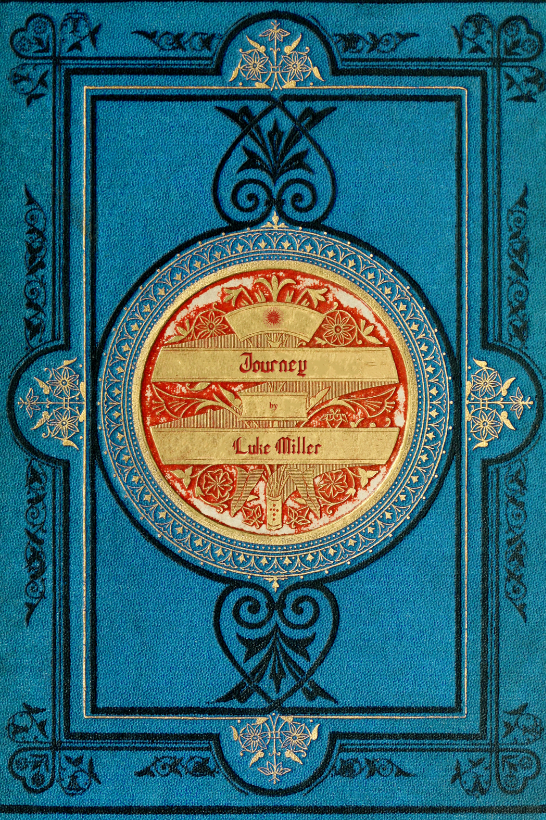
Full disclosure, this bestselling solo worldbuilding and roleplaying game was created by myself right here at Graycastle Press. So I may be a bit biased. Because I really think that Journey is special.
In Journey, you can explore the locations in your worlds in an engaging and immersive way. The setting that you explore can also be of any size and scope, from something as large as a galaxy to something as small as a single room.
This game has you select an entity within the space you want to explore and step right into their shoes. You’ll travel from place to place, imagining what the process of that travel would be like, and deeply explore interesting aspects of your destination that may never have been discovered otherwise.
Luke’s Take
Journey is a flexible and useful game (that I made myself) for writers who want to immerse themselves inside of their worlds and explore them in a new way.
Available in Digital and Paperback on DriveThruRPG
Available in Digital and Paperback on Amazon
Available in Digital on Itch.io
Learn More About Journey on Graycastle Press
Mythic Game Master Emulator
The classic option to let the game drive the action
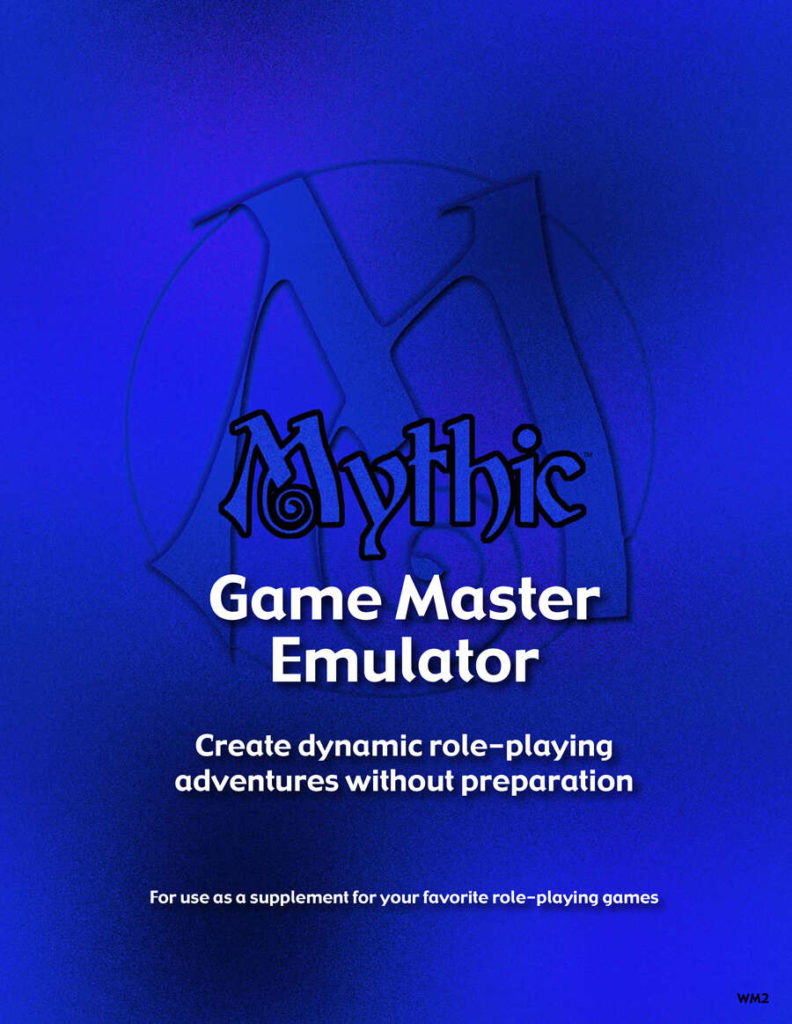
Where many games on this list tend to be more self-contained and narrative experiences, Mythic could realistically be used to let you run any typical tabletop roleplaying game without a game master, or entirely by yourself.
Rather than a guided narrative experience, Mythic uses a combination of their Fate Chart (a table of probabilities for how a question might be answered based on a few factors), some tabletop roleplaying game dice, and some other neat features to help drive the action of a scene. The whole process involves asking Mythic a question, one that can be answered clearly with a yes or no, and allowing the Fate Chart to determine the answer. You’ll have to interpret the Fate Chart result through the lens of your story and question, but you’ll likely find the guidance and randomness inspiring and useful.
It also takes the “chaos” of the action into account as a way to modify the result of your question’s answer, which can lead to some interesting and unpredictable results.
There’s enough to Mythic that it will likely get it’s own whole post here on the Graycastle Press Journal, but it all adds up to a really cool way to think through the flow of action and reaction in a scene.
Luke’s Take
Mythic is a fantastic solo roleplaying resource for writers who want to let this proven game master emulator help answer their questions and drive them towards new discoveries. Use it to think through how characters might move through a scene and address challenges, as well as the results of those actions, finding new ideas through the use of their Fate Chart.
Available in Digital and Paperback on DriveThruRPG
Available in Paperback on Amazon
Alone Among the Stars
The game about traveling through space and discovering wondrous new places
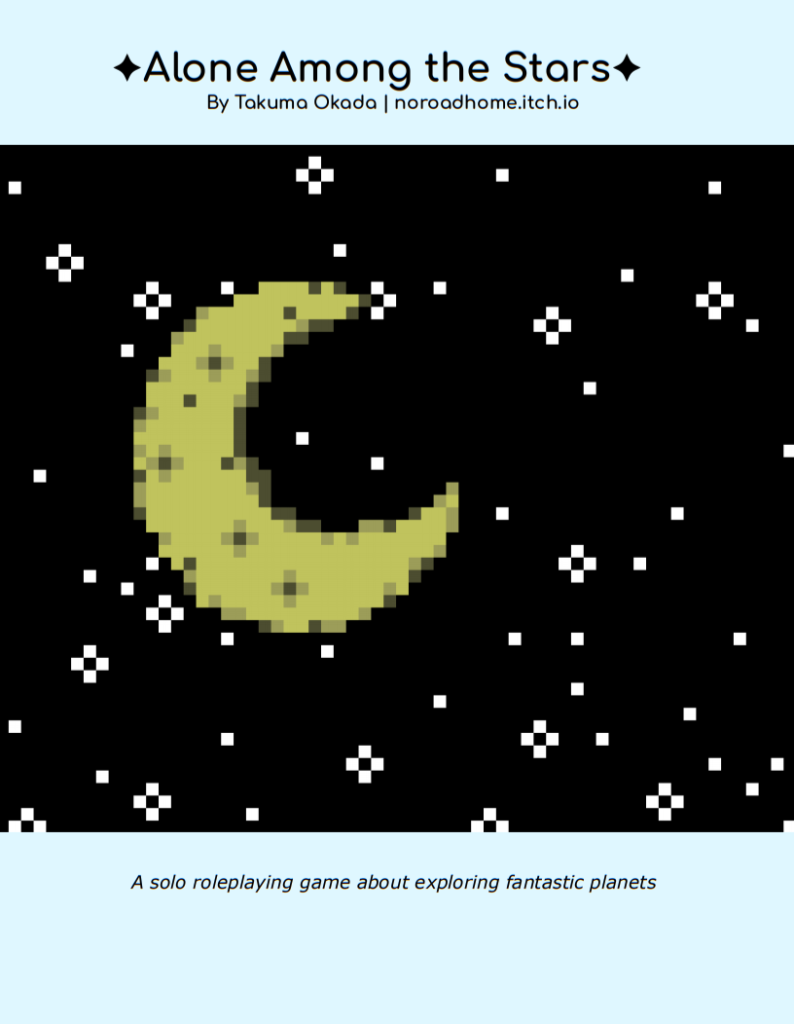
As one of the two games I credit with inspiring what ultimately became my first game Journey, Alone Among the Stars is a fantastic little game. Where Mythic is a bit larger and seeks to provide a pretty robust framework, Takuma Okada’s solo roleplaying game gives you more of an open platform to explore some creative ideas.
In this game you’ll find yourself traveling to a planet that you’ve never seen before, rolling a standard six-sided die to determine how difficult that travel is, and then using playing cards to determine what you discover there. Is it inhabited? Is there intelligent life there? What do these alien vistas look like? By using the prompts generated by your drawn cards you’ll dream up wild new places, never before seen by human eyes.
Writers might find it useful to explore their own worlds this way, drawing cards and using the tables from Alone Among the Stars to get some new inspiration for what fills it, or some new ideas of things that could be added. You might find something unexpected in a world you are confident you know inside and out.
Available in Digital Format on Itch.io
Artefact
The game exploring the stories surrounding mythical items of legend
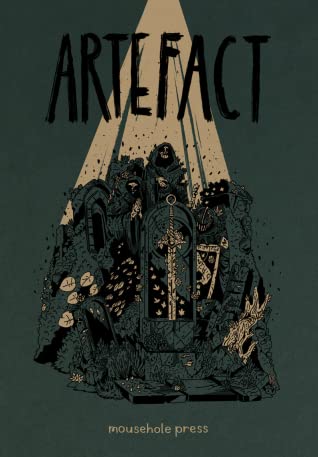
This is the second of the games that inspired me to create Journey, along with Alone Among the Stars, above.
Rather than looking at the action in your scene or the physical spaces and locations in your worlds, Jack Harrison’s Artefact helps you explore the histories and stories that surround the magical and influential items throughout your world.
Artefact has you choose a legendary item in your world, whether that’s a weapon, a book, a musical instrument, or a variety of other kinds of item. You’ll then step through the mists of the ages, following your chosen item as it moves from person to person throughout time, exploring how these Keepers have used the item in legendary ways.
Especially if your story features influential and powerful objects, Artefact gives you a framework that allows you to dive through time and learn more of how these items have impacted and shaped history. You’ll come out the other side of a session of Artefact having seen flashes of your world’s history and a better understanding of what may have changed over that course of time. You’ll also have a more interesting and complete view on the item that you chose.
Luke’s Take
Artefact was the first game I played that encouraged you to focus your whole session around a single specific subject and spend some time dreaming up stories and histories about it. I still find it wildly entertaining and inspirational, and it’s helped me dream up some truly interesting stories for my writing and my tabletop roleplaying game campaigns.
Available in Digital on Itch.io
Microscope
The game of creative history building
7/3/22 – Quick Disclaimer from Luke: It was pointed out to me, correctly, that Microscope is not actually a solo game, despite a subset of players using it that way. The creator has actually clearly laid out that playing this game with others is a core part of the process, and playing alone will cause you to lose out on critical parts of the experience. I’m leaving the game on this list with this disclaimer, though, as it’s such a stellar example of the genre and an incredibly creative tool, despite not being strictly a solo game.

Often we can understand the present by exploring the past, or use the present to inform a view of the future. Microscope by Ben Robbins is an award winning and bestselling game that sees players creating vast histories of a universe, jumping back and forth through time to learn more about the causes and effects that have and continue to shape the world in which you’re creating.
By applying the process of playing Microscope to your setting you’ll find out how things became the way they are, the formative experiences and events that have shaped the stories of the people and places of your world. It’s something you just have to try, because once you do, you’ll be hooked.
I think that Microscope’s description does a really great job of selling the whole “jumping around in time to explore cause and effect in a universe” idea:
You won’t play the game in chronological order. You can defy the limits of time and space, jumping backward or forward to explore the parts of the history that interest you. Want to leap a thousand years into the future and see how an institution shaped society? Want to jump back to the childhood of the king you just saw assassinated and find out what made him such a hated ruler? That’s normal in Microscope.
From the official description of Microscope
Luke’s Take
Honestly, Microscope is a freakin’ exciting game. I’ve gotten so many interesting ideas and points of view on my worlds by exploring their histories, and whether or not I used all of those ideas in my projects, I’ve never regretted the time spent dreaming them up.
Available in Digital on DriveThruRPG
Available in Digital on Itch.io
Available in Paperback on Amazon
Ex Novo
The game about building immersive cities and towns
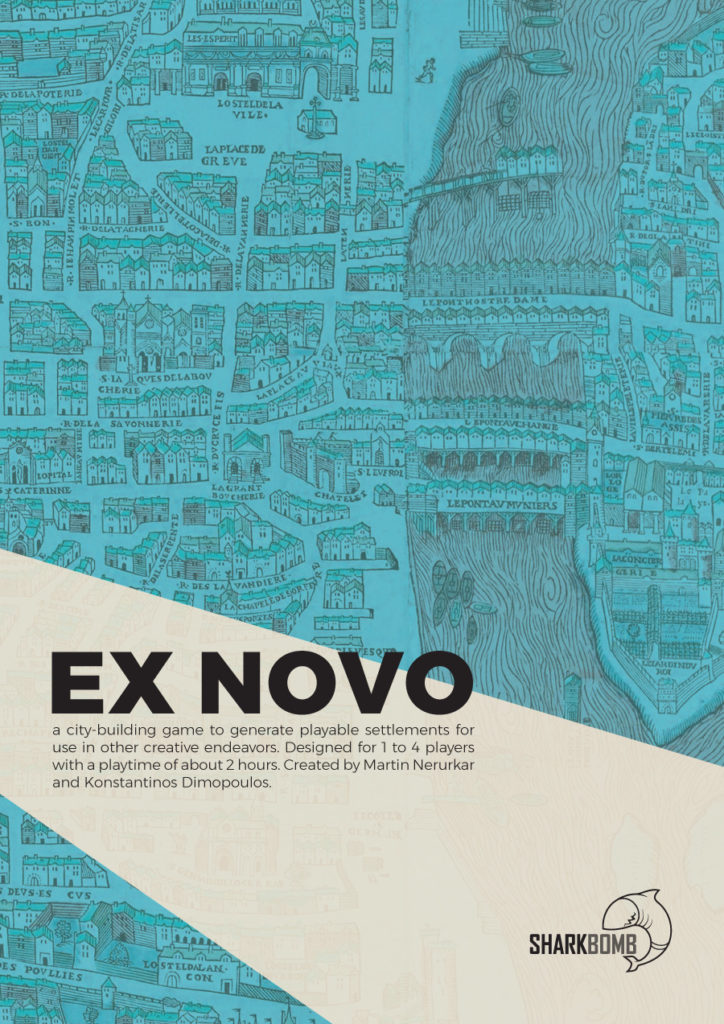
When writing and creating in your worlds and interacting with larger settlements of people, it can be helpful to feel like you more deeply understand those cities and towns. Knowing why these places are the way they are, and knowing where points of interest are located within them, can make your stories set in these places more vibrant.
Ex Novo by Martin Nerurkar and Konstantinos Dimopoulos puts you in the role of the guardian spirit of a newly founded settlement somewhere in your world. You’ll then move through four phases of the game that explore your assumptions and expectations of what you’ll learn, the space around the settlement and events of its founding, it’s growth and development over time, and where it is now.
You’ll walk away from your session of Ex Novo with a deeper understanding of this settlement, why people gathered there and brought it into being in the first place, and the events that have transpired there over the course of its history to bring it where it is today.
Oh, and you’l have a hand drawn map of your chosen settlement, too, which is wildly fulfilling to look at, admire, and iterate on as the basis for more fully formed maps.
Luke’s Take
This game is so good for dreaming up new settlements or exploring the history of places of interest in your story. Ex Novo has helped me explore the histories of a few places in my projects, and it’s always neat to see their growth and changes over time from the perspective of the location’s guardian spirit.
Available in Digital on DriveThruRPG
Available in Digital on Itch.io
BOLD
The game of legends and deeds
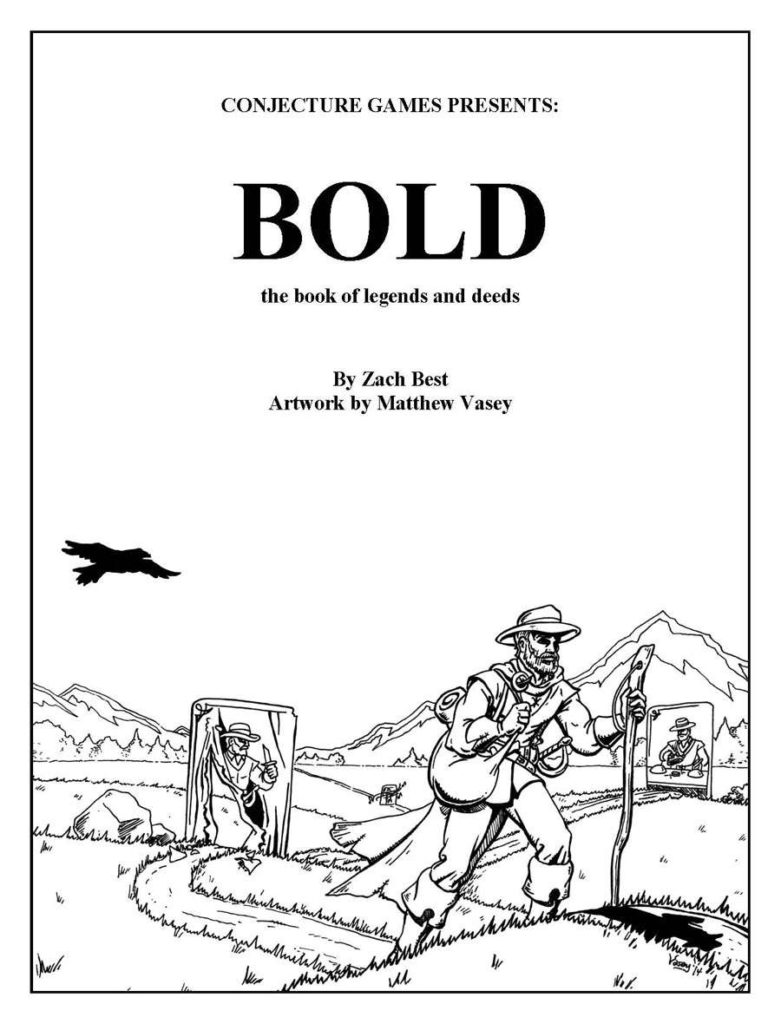
Less a full game and more a tool for telling stories, Zach Best’s BOLD (The Book of Legends and Deeds) is a really amazing tool for instantly adding histories of brave deeds and exciting legends to any character. You’ll see how those characters overcame those challenges in interesting and compelling ways, adding depth and color to these people.
Playing BOLD just requires the book, a handful of dice rolls, and your imagination to flesh out your characters in interesting, new ways. You can apply it to any character in any setting, from fantasy historical fiction, and give them a whole new dimension of connection to the world around them and a sense and weight of history.
Luke’s Take
When you want to deepen the stories around the characters in your stories, BOLD is a really unique and interesting way to do so. You can even use it to generate stories around other things in your books, like histories surrounding objects and locations. It’s a really need and well-established tool that might help you generate some really interesting ideas.
Available in Digital on DriveThruRPG
Archived
The game exploring the stories around documents, books, and maps in a fictional library
Similar in some ways to Artefact, above, Archived is a game that sees you following the history of a specific item. However, in this case, the item is not necessarily one that has featured in grand, historical events. Instead you step into the role of an item in the collection of a library.
Over the course of a session of Archived you, as your chosen document in this library, will experience patrons engaging with you, using you and the information you contain, and eventually placing you back on your shelf to wait until you’re taken down once more. You’ll experience the passage of time, the intervening years alone on a shelf, and feeling your physical form changing over that time.
It’s worth noting that the game’s page has a content warning regarding the book exploring the topics of loneliness, isolation, and of being used. They recommend playing at your own pace, stopping when needed, and taking care of yourself. Which, honestly, is pretty good advice for life in general.
Luke’s Take
While possibly more difficult to slot in to solving a specific problem or challenge for writers, playing through Archived is a super creative and interesting look at the sources of knowledge in your world, as well as an exploration of how people in the world use and apply that knowledge. Who knows what inspiration for your project is hidden in those stories?
Available in Digital from Itch.io
DELVE
The game of map drawing and city building
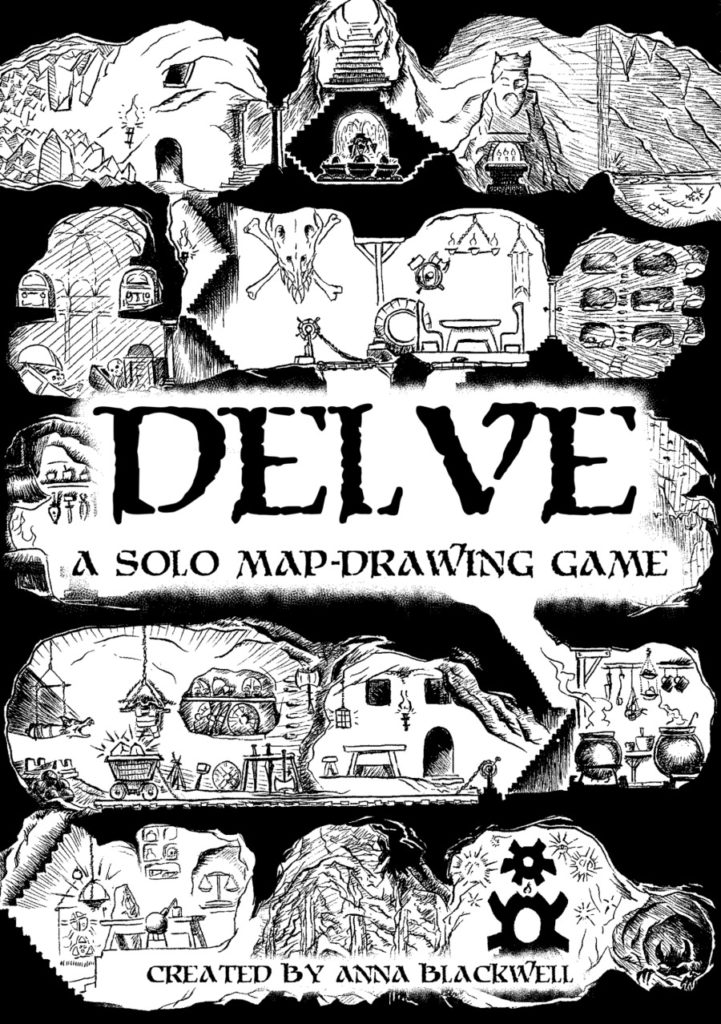
If you’ve ever played the classic video game Dwarf Fortress, you’ll have some idea of what Anna Blackwell’s DELVE is about. When starting a session you’ll find yourself in control of a newly claimed stronghold of dwarven folk and tasked with leading the underground city to either it’s ascending glory or ignoble demise.
During your time leading your people in growing their new settlement you’ll be challenged with floods of water, dangers of natural gasses and lava, as well as darker, more supernatural horrors deep underground that have been there for centuries.
More of an actual adventure game than some games on this list, DELVE sees you forming and leaving this dwarven hold, offers mechanics and tools for generating special dwarven artifacts and ancient dangers and monstrosities, and even be given the tools and structure for some lightweight tactical combat.
And, similar to Ex Novo, above, you’ll draw out your stronghold over the course of your session, walking away with more than just new stories and inspiration.
Luke’s Take
It’s not the most well suited for handling specific questions or issues within a story you’re writing, but the process of playing through DELVE is just freakin’ fun. Not every solo adventuring game that tasks you with challenges more akin to a traditional group-based tabletop roleplaying game gets it right, but DELVE is so smooth and enjoyable. I’ve gotten some great ideas for my tabletop campaign that I run and some interesting abstract ideas, creatures, and items that might one day make it into one of my writing projects.
Available in Digital on DriveThruRPG
Available in Digital on Itch.io
Available in Paperback on Amazon
I Am the Forest
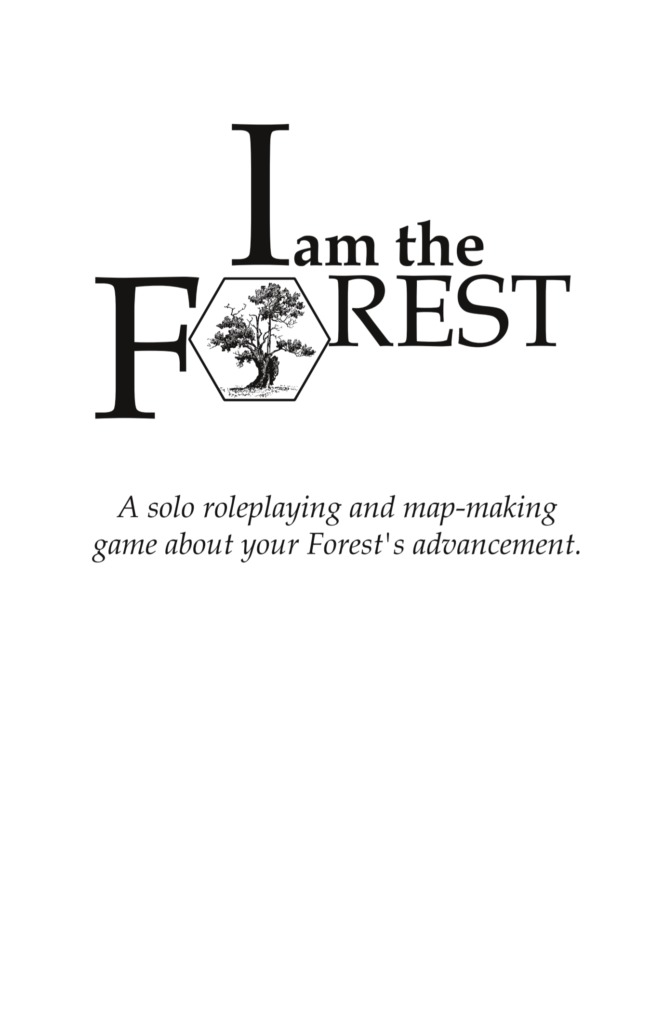
I Am the Forest by Seth A. Faerber is such a charming and fun game that is still in play testing, but I had to add it to my list. Rather than a discrete person, this game has you step into the role of an entire forest whose edges have begun to be intruded upon by a threatening civilization.
You’ll move through your session by creating your Forest and working to drive back your Enemy, an unknown encroaching civilization that destroys and desecrates your land. You’ll wield Forest Abilities to give yourself an edge over your Enemy and see how the conflict evolves over time.
And similar to Ex Novo and DELVE, above, the game has you draw a map of your domain and changes to it over time. You’ll have a really interesting an unique perspective on the location at large, and might just discover things lurking within the trees, just waiting to be discovered within your creative work.
Luke’s Take
I recently used I Am the Forest to get a wildly different perspective on a location in a writing project of mine. Where previously I kept looking at this growing town from the perspective of the people, which makes sense as that’s who we’re most often writing about, I instead looked at it from the perspective of the forest the town was taking land from. It really made me see some interesting aspects of the people and how they might be harming the land versus living with it.
Available in Digital on Itch.io
Quill
The game about writing compelling, beautiful correspondence
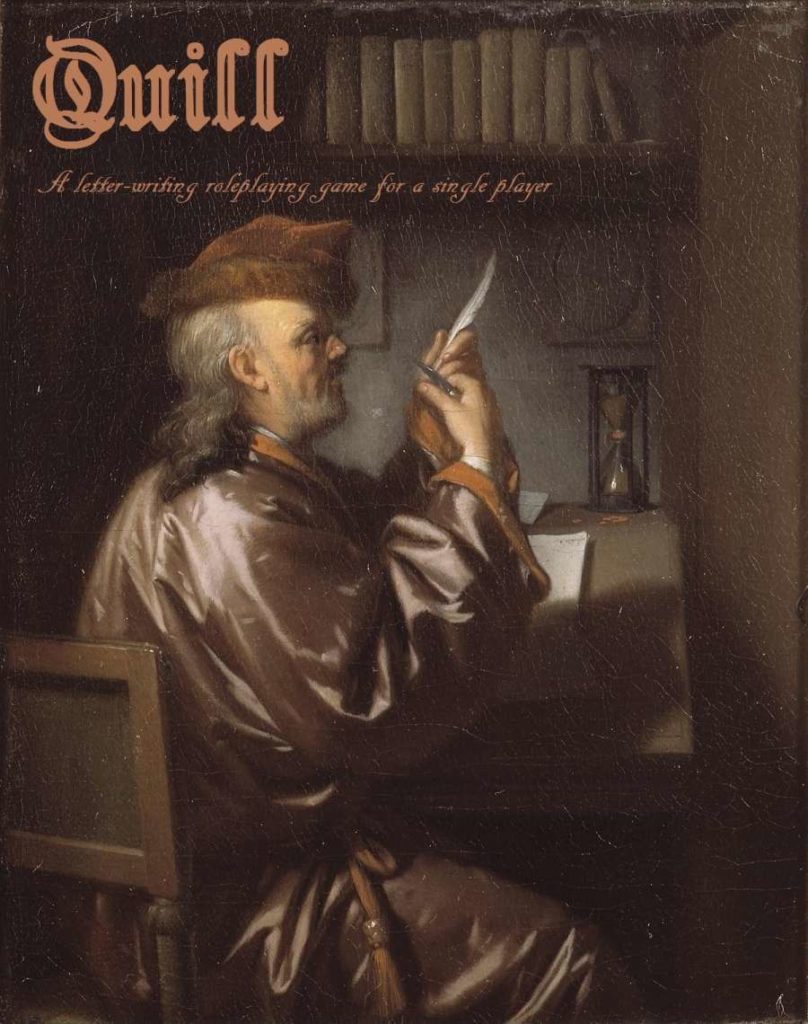
A truly interesting and unique game, Scott Malthouse’s Quill leaves the tabletop roleplaying game tropes of mighty wizards and powerful fighters behind and sits you at a desk to write.
I know, recommending a game about writing to writers? Groundbreaking.
Where traditional adventure games often have you assume the roll of a character with skills like strength and charisma who delve into dungeons in search of gold and glory, Quill has you roll dice to see how well wield Penmanship, Language and Heart as the skills you’ll use to write the best letters you can. Roll badly and you could find yourself writing a truly horrible bit of correspondence.
Luke’s Take
This game is so good for writers, and it offers some really amazing worldbuilding opportunities. You could assume the roll of a character within your world and actually write correspondence as them. Just imagine the perspective you’d get on their relationship with the recipient, the events in the world around them, and their own personality and motivations by inserting yourself into this activity!
Available in Digital on DriveThruRPG
Available in Digital on Itch.io
Available in Paperback on Amazon
Tilt
A tool for generating and overcoming obstacles
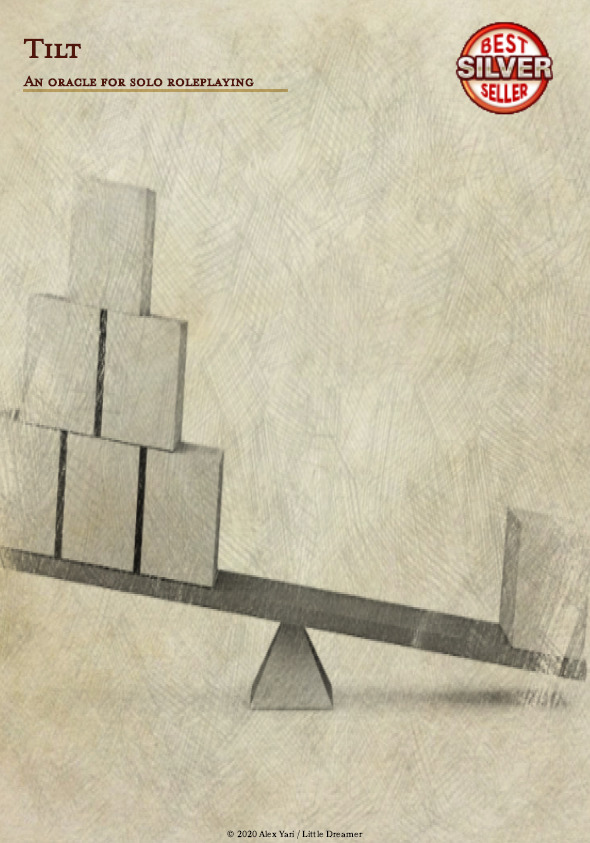
Similar in some ways to Mythic and BOLD, above, Alex Yari’s Tilt is what folks refer to as an oracle, a tool that helps generate creative information and answers to questions in these kinds of games. In this case, it was created specifically to help those who are playing tabletop roleplaying games solo drive the action forward without having a game master to lead that process.
Tilt approaches this concept a little different from other oracles, aiming to help you generate obstacles within a story and then encourage creative problem solving to address those obstacles using the resources available to the characters in the action. It has a unique twist on the concept of helping answer yes or no questions (again, similar to Mythic) which will help inform and drive the action in your scene forward.
Luke’s Take
Oracles like Tilt are such good tools for writers to have on hand while they outline (or not, if you’re a pantser). You’ll have creative and often unexpected answers to the questions that you face, and Tilt can help you answer those questions and explore those scenarios with an eye towards doing so with the resources that the characters involved have available to them.
Available in Digital on DriveThruRPG
Solo Tabletop Games are Great for Writers!
Any one of the games in this list is such a good resource to try out if you’re a creative writer who wants a new tool to help generate new inspiration, gather new creativity, and solve some of the problems that you might face in your writing. They can usually help you to quickly and easily explore a situation in your creative work and ideate a variety of ideas for how scenes and situations might progress and evolve and put yourself in totally different perspectives within your setting that you might never have seen otherwise.
Next time you’re feeling challenged by your creative writing work and need some help getting inspired, give one of them a try!

Frustrated Darren
I found it hard to get free games off of drive-thru even though they say you can get them they still ask for a credit card. When you just want to get a quick free download that’s not the place to go. It’s hard to navigate their pages. It should be easier to get a free game. They tell you that they have games for free for people that are financially hurting. But then when you go to try to download one it ask you for a credit card.
Luke Miller
That’s super weird, whenever I’ve purchased a free game (or put a value of 0 for a pay-what-you-want game), I’ve never been charged or asked for a card. It normally just bypasses the payment info screen, unless there are any games in the cart that are actually paid for. I’d reach out to DTRPG support if it continues to ask you for a card, that sounds like a bug to me.
Patrick Buechner
Hi Luke, this is a great list.
The latest issue of The Soloist (soloist.substack.com) is all about solo and co-op worldbuilding games. I included Journey as one of my top 5 games. Thanks for putting together a great book!
Kiara
Hi, I don’t know if you’ve ever heard of Cartograph, but it’s also a wonderful solo journaling game where you adventure around a region as you draw the map. It was actually through the latest edition that I found out about Journey. Now I am solidly and happily down the rabbit hole of solo RPGs!
Luke Miller
That’s so great! I have seen Cartograph though I’ve yet to play. I do LOVE the aspect of using dice rolled on a page to form the shapes of the map, a mechanic I’ve seen in a few games (recently I saw it in Stoneburner by Fari RPGs and it’s done in such a *chef’s kiss* way). Welcome to the solo RPG rabbit hole!